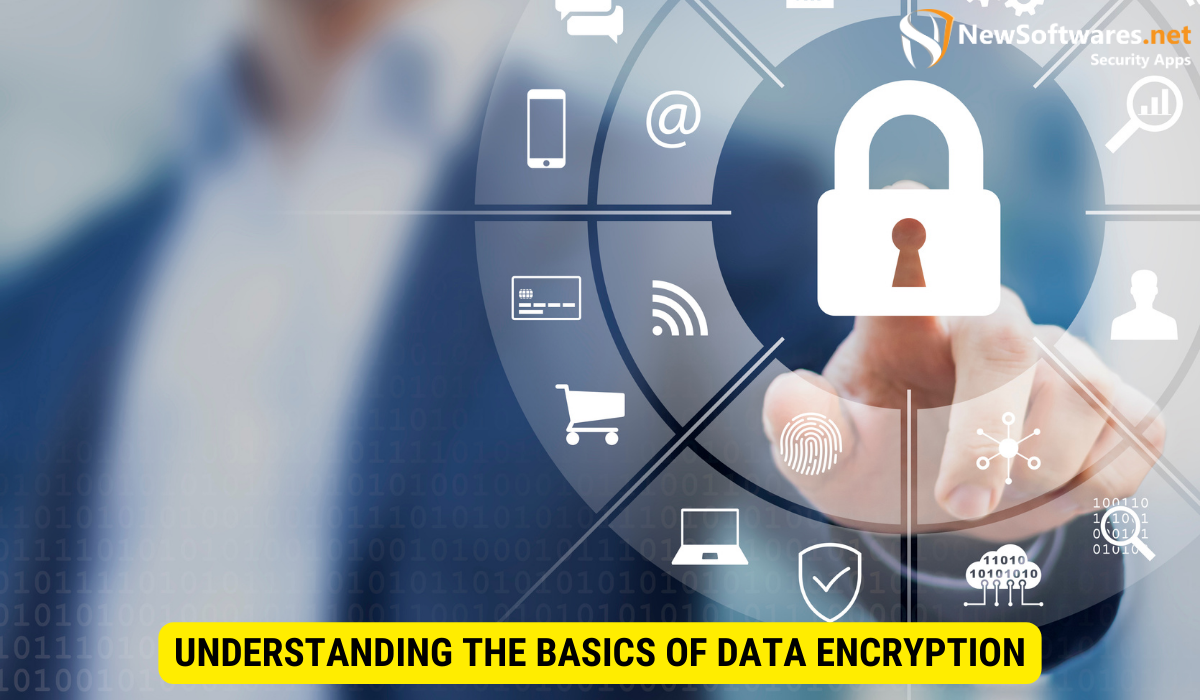Encrypting data on a phone means converting it into a coded form that can only be accessed with the correct decryption key or password, ensuring its security and privacy.
Data encryption on phones is a crucial aspect of protecting the privacy and security of our personal information. In this digital age, smartphones carry many sensitive data, ranging from personal photos and messages to financial and confidential information. Encrypting data on our phones ensures this information remains secure and inaccessible to unauthorized individuals.
Understanding the Basics of Data Encryption

Before delving into the process and benefits of encrypting phone data, it is essential to grasp the fundamentals of data encryption.
Data encryption refers to converting data into a coded form that can only be accessed with the accurate decryption key or password. Encryption algorithms use complex mathematical calculations to transform the original data into a scrambled format, making it nearly impossible for anyone without the credentials to decipher the content.
But what exactly happens during the encryption process? Let’s take a closer look. When data is encrypted, it goes through a series of steps to ensure its security. First, the data is broken down into smaller chunks called “blocks.” These blocks are then processed using a specific encryption algorithm, which applies mathematical functions to transform the data. The algorithm uses a secret key, a unique string of characters, to perform these calculations. This key is essential for both encryption and decryption, as it determines how the data is transformed and how it can be reversed.
Once the encryption process is complete, the encrypted data appears as a jumble of seemingly random characters. This encrypted data is virtually indecipherable without the correct decryption key or password. Even if someone manage to intercept the encrypted data, they won’t be able to make sense of it without the key.
Importance of Data Encryption
Data encryption is critical in safeguarding sensitive information stored on our phones. Here are a few reasons why data encryption is of utmost importance:
- Data Protection: Encryption ensures that unauthorized individuals cannot access or understand sensitive data, providing an additional layer of protection for personal information.
- Privacy Enhancement: Encryption safeguards our privacy rights by preventing unauthorized surveillance or access to our digital lives and personal data.
- Compliance with Regulations: Many industries and sectors, such as healthcare and finance, have specific regulations requiring the encryption of sensitive data to protect customer confidentiality.
Regarding data protection, encryption acts as a powerful shield against unauthorized access. It adds an extra layer of protection, making it significantly more tough for hackers or malicious actors to access sensitive information. By encrypting phone data, individuals can have peace of mind knowing that their personal information, such as passwords, financial details, and private messages, is safe from prying eyes.
Moreover, encryption plays a vital role in enhancing privacy. In an era where digital surveillance is becoming increasingly prevalent, encryption helps protect our digital lives from unwarranted intrusion. It ensures that our data remains confidential and inaccessible to anyone without authorization.
Furthermore, compliance with regulations is another crucial aspect of data encryption. Various industries, such as healthcare and finance, handle sensitive customer information regularly. To ensure the confidentiality and integrity of this data, regulatory bodies often mandate the use of encryption. By adhering to these rules, organizations can demonstrate their commitment to protecting customer confidentiality and avoid potential legal consequences.
In conclusion, data encryption is a fundamental aspect of securing sensitive information. By understanding the basics of data encryption and recognizing its importance, individuals and organizations can proactively protect their data and maintain privacy in an increasingly digital world.
The Process of Phone Data Encryption
Now that we understand the significance of data encryption let’s explore how phone data encryption works and the different types of encryption methods employed.
Phone data encryption is crucial to securing personal information on mobile devices. It involves scrambling the data stored on a device using an encryption algorithm, making it unreadable to unauthorized users. When the phone is locked or powered off, the data remains encrypted, providing additional protection.
Upon entering the correct passcode or biometric authentication, the device decryption key decrypts the data, making it accessible to the user. This process ensure that only authorized persons can access the sensitive information stored on the phone.
How Does Phone Encryption Work?
Phone encryption is a complex process that involves several steps to ensure data security. The device generates a unique encryption key when the user sets a passcode or enables biometric authentication on their phone. This key is used to scramble the data stored on the device.
The encryption algorithm employed by the phone converts the data into an unreadable format by rearranging the bits and bytes. This transformation makes it virtually impossible for anyone without the decryption key to understand the information stored on the device.
Furthermore, the encryption key is securely stored within the phone’s hardware or operating system, making it difficult for hackers or unauthorized individuals to access. This ensures that the data remains protected even if the phone falls into the wrong hands.
Types of Phone Data Encryption
There are two primary types of phone data encryption methods: hardware- and software-based.
Hardware-based encryption utilizes dedicated hardware components integrated into the phone’s processor, ensuring higher security. These hardware components are designed to handle encryption and decryption processes, making them more efficient and resistant to attacks.
On the other hand, software-based encryption relies on the device’s operating system and encrypts data using software algorithms. This type of encryption is more flexible as it can be implemented on a extensive range of devices. However, it may not provide the same level of security as hardware-based encryption.
Both hardware-based and software-based encryption methods have their advantages and disadvantages. Hardware-based encryption offers stronger protection against attacks but may be more expensive. While more cost-effective, software-based encryption may be more susceptible to vulnerabilities in the operating system.
Ultimately, the choice between hardware-based and software-based encryption depends on the user’s specific needs and security requirements. Phone manufacturers and software developers continually strive to improve encryption methods to ensure users’ highest level of data security.
Benefits of Encrypting Phone Data
Encrypting phone data provides several key benefits that enhance security and privacy.
Security and Privacy Enhancement
By encrypting phone data, users significantly reduce the risk of unauthorized access to their personal information. Encryption protects against various threats, including theft, data breaches, and malware attacks, ensuring that the data remains safe even if the device falls into the wrong hands.
Protection Against Data Breaches
Encryption serves as a powerful defense against data breaches. In the event of a breach, encoded data is useless to hackers without the encryption key, limiting potential damage and reducing the likelihood of identity theft or data misuse.
Potential Drawbacks of Phone Data Encryption
While phone data encryption offers many advantages, it is essential to consider some potential drawbacks that may happen.
Possible Performance Issues
Encrypting and decrypting data on the phone requires additional computational resources, which can impact device performance, particularly on older or less powerful devices. However, technological advancements have led to more efficient encryption algorithms that minimize performance impact.
Recovery Challenges
In the event of a forgotten password or lost encryption key, recovering encrypted data may be challenging. Without the appropriate credentials, the data may become permanently inaccessible. Therefore, users must maintain secure backups and keep their encryption keys safe.
How to Encrypt Data on Different Phone Models?

Encrypting data on phones varies depending on the operating system and device model. Let’s explore the encryption methods for Android phones and iPhones separately.
Encrypting Data on Android Phones
Android devices offer built-in encryption features. To encrypt data on an Android phone, navigate to the device’s security settings and look for the encryption option. Follow the instructions provided to initiate the encryption process. It is worth noting that the device must be fully charged and connected to a power source during encryption.
Encrypting Data on iPhones
iPhones come with data encryption enabled by default. When setting up an iPhone, users are prompted to create a passcode, the device’s encryption key. To ensure data encryption is active, users can navigate to the device’s settings, select “Touch ID & Passcode” or “Face ID & Passcode,” and verify that the data on the device is encrypted.
Key Takeaways
- Data encryption is essential to protect sensitive personal information stored on smartphones.
- Encryption converts data into a scrambled format, making it inaccessible without the proper decryption key or password.
- Phone data encryption enhances security, privacy, and compliance with regulations.
- Hardware-based and software-based encryption are the primary types of phone data encryption methods.
- Encrypting phone data offers enhanced security, privacy, and protection against data breaches.
FAQs
Here are some frequently asked questions about phone data encryption:
Is phone data encryption only necessary for business users?
No, phone data encryption is essential for all users. It provides security and privacy for personal information, including photos, messages, and financial data.
Is it possible to decrypt phone data without the encryption key?
Without the encryption key or password, decrypting phone data is extremely difficult. In most cases, it is practically impossible without state-of-the-art technology and significant resources.
How often should I encrypt my phone data?
Once encrypted, the data remains so until decrypted. However, encrypting the data immediately after setting up a device or when sensitive information is stored is advisable.
Can encrypted data be recovered if the password is forgotten?
The encrypted data may become inaccessible if the encryption key or password is lost. It is crucial to keep the encryption key secure and regularly back up important data.
Does encrypting phone data affect third-party apps or cloud services?
Encrypting phone data typically does not impact third-party apps or cloud services directly. However, certain apps may require additional authentication steps to access encrypted data.
Conclusion
Encrypting data on phones is essential to ensure the privacy and security of our personal information. By understanding the basics of data encryption, its benefits, and potential drawbacks, users can make informed decisions about protecting their sensitive data. Whether using Android or iPhones, following the device-specific encryption methods provides peace of mind and strengthens the overall security posture.
